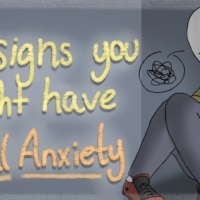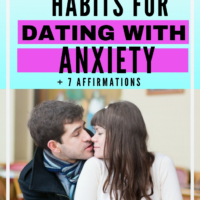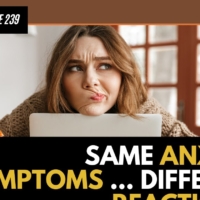Autism & Mental Health – Do ALL Autistic People Have Anxiety?
Do all Autistic people have anxiety? I’ve heard people, even
medical professionals, say things like, “Oh, anxiety. That’s just part of being Autistic. All Autistic people have anxiety.” If you’d like to hear my
thoughts on this, stay tuned. First, to be very clear, Autism and
anxiety are independent conditions that sometimes can co-occur. Medical experts claim that it is
not easy for them to recognize the presence of anxiety in Autistic
patients, because of – I’m going to quote this “overlapping symptomology
and altered presentations of symptoms”.
They say they “can’t tell the difference
between meltdowns caused by anxiety and those that crop up from other
reasons related to being Autistic.” Meltdowns are often toted as signs that
someone might be Autistic, but I’m going to say that they are not a by-product
of being Autistic because not all Autistic people have meltdowns and I’ll
share more on this in just a minute. Many Autistic people have
co-occurring mental health conditions. When an Autistic person has another health
condition, it is called a dual diagnosis. Data on the prevalence of anxiety among
Autistic people vary widely from 22 to 84%, depending on the study. Many Autistic people have clinically
elevated levels of anxiety, or at least one diagnosable anxiety disorder,
such as OCD, generalized anxiety disorder, social anxiety, separation,
anxiety, or another specific phobia. It is estimated by the American
Psychiatric Association, that one in five adults, that’s 19% in the United States of
America, overall, has a mental illness.
These numbers are higher among
Autistic and Neurodivergent populations, as is expected, because
also according to the APA minority groups are often at higher risk of
developing mental health conditions. I will list these links on the blog
page at NeuroDivergentRebel dot com so that you can see this data as well. Although, not all Autistic people will
have a diagnosable anxiety disorder, generalized anxiety disorder is one
of the most common conditions that is diagnosed in Autistic people. To the untrained, and even sometimes
the professional eye, unfortunately, anxiety may seem to be a prominent
feature of Autistic people – even though it is not part of the
diagnostic criteria for autism. When we dive into some of these symptoms
of anxiety, it becomes clear where some of this confusion comes from. Here are some symptoms of anxiety:
Obsessive thinking, excessive worrying – normal situations over things
that most people don’t even worry about in situations where worrying is not helpful. Another symptom of anxiety
is being irritable and having trouble regulating your emotions.
People with anxiety disorders struggle
to reduce their arousal when they get anxious as quickly as people
who don’t have anxiety disorders. That means when people who have
anxiety disorders are triggered, they may feel the effects of anxiety
for longer periods than people who don’t have these
more intense anxiety issues. Something else that sucks about
having anxiety is that it can impact your ability to concentrate and it
can mess with your working memory.
That’s not great. Anxiety can trigger severe and intrusive
thoughts, depending on the individual. That can make it very
difficult to concentrate and even accomplish daily tasks. Anxiety can also interrupt working
memory – the memory that is responsible for holding short-term information. My least favorite thing about anxiety
is panic attacks – easily handed down. When you have a panic attack, you have
your flight, fight, freeze response and your brain has been triggered. Anxiety is
your body’s alarm system. It is there to protect
you and keep you safe. If your brain believes you’re in danger,
it is supposed to prepare you to react to that danger so it’s going to prepare your
systems to go into a dangerous situation. The problem is, when you have an
anxiety disorder, your brain is telling you that there is danger when
there is no danger and your brain is being triggered by things that
are not a threat to you.
Panic attacks produce feelings of extreme
fear, panic, and dread accompanied by unpleasant physical sensations,
such as nausea, sweating, flushing, shaking, rapid heartbeat, and dizziness. You may find it hard to breathe. It is just a horrible, horrible situation. These panic attacks can seem
to come out of nowhere sometimes, and that makes them even worse and
can lead to even more anxiety about when the next one might come on.
Similarly, an Autistic person may have
a meltdown if they are overwhelmed. Autistic meltdowns can be
triggered by overwhelming sensory experiences, emotional experiences,
sudden changes, or surprises. At least with the meltdowns,
I’ve found it’s a bit easier to determine what my triggers are. I want to stay, specifically,
with anxiety disorders before we go more deeply into autism. Another symptom of anxiety can
be increased sensory sensitivity. Anxiety also will increase your heart
rate and it heightens your senses. That’s part of this body and
brain preparing for danger that I was talking about just a minute
ago – heightening your senses.
This could potentially be
helpful if you were about to go into the fight of your life. If you were actually in danger. If you feel like you are about to go
into the fight of your life frequently. You feel like you are
always about to fight. Everything is about to be a fight. You are ready to battle. That’s exhausting and you may
feel agitated or restless. These are other signs of anxiety,
restlessness, and agitation. You’re tense. You’re, you’re tight. You’re restless. You’re ready to go in
case you have to run. People with anxiety disorders,
often, report feeling restless quite frequently, which makes a lot
of sense if you feel like you may have to run or fight at any minute. Then there are the physical signs of
anxiety, muscle tension, because your muscles are tense if you’re always
ready to go and ready to run from danger, and then you don’t run
-because there was nothing to run from. You’re just like a spring, loaded,
and ready to go at all times. Digestive issues and stomach
problems are one of the most common symptoms of stress and anxiety.
I unfortunately know this one
from a lot of personal experience. Sleep problems are very common
in people who have anxiety. When you have anxiety and you manage to
treat your anxiety, a lot of times people will report that their sleep does improve. A lot of Autistic people
also have sleep problems too. Other physical symptom of
anxiety can be headaches, heart palpitations, and dizziness. Headaches -they suck and they’re
a lot more likely for people who have anxiety. So how does this relate to autism? Autistic people are more likely to have
specific anxiety around a few things: Anxiety around sensory processing because
there is a constant assault from a world that isn’t designed with Neurodivergent
sensory processing systems in mind.
We sometimes may have
anxiety around communication. We are likely to
experience social anxiety. This is a diagnosis I received
when I was diagnosed Autistic. Because people are constantly telling
you that you are socializing wrong or they’re misunderstanding you,
or you’re misunderstanding other people – vice versa, back and forth. It’s a two-way thing. You can become very nervous around
those social situations because some of us we’ve experienced, repeated,
painful, social failures over and over again in our lifetimes. Then we can develop anxiety around
social situations because of it. We may also develop anxiety around
change and not knowing the future. In general, I am someone who
needs a lot of structure. When I am anxious, I do experience a
lot more resistance to minor changes, especially to my routine or my plan. If I’m going through a hard time,
my plan might be the only thing I’m hanging on to and I need to
have control over that plan and that can become important to me.
Sometimes I can make my plan a little
bit looser, but it just depends on how much control I need over my life at that moment. When I am anxious, I am more
likely to be irritated, agitated, and short with other people. I am more likely to withdraw socially or
shut down and require a lot more solitude. I may become more avoidant of eye
contact, and more in my own space to where I tune out other people
more, even when I am around other people, I just kind of tune them
out and am in my little world.
When I am more anxious, I may engage in
more “repetitive behaviors” as they’re called in the diagnostic criteria. More echolalia, talking to
myself, more self-soothing. I may be visibly stimming a lot more.
– things that are a bit more obvious to outsiders, and that is because, like
we were saying earlier, when you’re anxious you’re constantly like feeling
like you might need to get up and move all of that energy has to go somewhere. I am more physically active when I
have anxiety coursing through my veins. I have to get that out. So that becomes more visible. I’m also more likely to listen to one
song on repeat versus listening to an entire album on repeat or listening
to an entire playlist on repeat.
Going back and watching old familiar
movies and shows from when I was younger, and things like that that
are very comforting and very soothing. There are some darker sides to this. If my anxiety flares up and gets
bad, I am more likely to have intrusive thoughts. When I’m anxious, and I’m not doing
well, it is more likely that I might engage in more harmful, repetitive
behaviors, like in the diagnostic manual – like biting my nails and my lips
chewing my lips, chewing my tongue, picking my cuticles, and my skin. If I have like a scratch or something,
picking at it just mindlessly.
I don’t even realize I’m doing it. I’m more likely to do that if I am in a
period of anxiety or low mental health. When I’m anxious, I’m even more
sensitive to sensory input than I normally am and things that wouldn’t
normally bother me might be too much. I may even be drawn to more sensory
soothing activities than normal, if I am feeling anxious, to try and counteract
some of that overwhelming energy.
My digestive system stops working
properly when I’m anxious. I will drop weight. I often stop
eating because I’m just not hungry and food doesn’t seem or taste appetizing. If I do eat, the food
will go right through me. I also tend to have more
headaches and insomnia flares. All of these things tend to build
up, having compounded impacts on one another, further hindering my ability
to function as expected in this world. My anxiety has had ups and
downs throughout my life. I feel very lucky to be in a period
of very low anxiety right now. I’m so grateful and I hope it
lasts, but I am not going to take it for granted just in case.
Mental health can be a fragile thing and
I’m working hard to keep things under control, but I already know, through lots
of painful experiences, that things with mental health aren’t always that simple. When my mental health is good,
a lot of these problems that I listed become lessened. It’s a delicate balance. When something tips the scales and it
becomes too much, then all of the dominoes can, suddenly, come crashing down and one
by one, I see myself progressing, burning out and spiraling, as I shut it on myself. What’s autism? What’s the anxiety? What’s an
Autistic person with anxiety look like? What’s an Autistic person
who’s not anxious look like? We don’t see enough of that. We’re not asking these questions. After I spiral, I’ve found myself,
many times, left picking up the pieces, rebuilding myself.
That’s why these static functioning
labels are not helpful to Autistic people. Our functioning can fluctuate
greatly sometimes from day to day, week to week, or even year to year,
depending on the different situations, circumstances, and medical conditions,
that we have throughout our lifetime. For many years, over an extended period in my life, I had been doing very well, until one change happened and it
was more than I could handle without help. For an extended period, no help was available. So I found myself in a
steady spiral of decline. I was at a low point in my life when I
was diagnosed Autistic at the age of 29. It’s taken me four and a half
years to rebuild myself after that event and I’m still building. All right everyone that
got serious real quick. Thank you so much for hanging out
this week, as we dove deeply into the question that is asked, more
frequently than I feel it should be, “Do all autistic people have anxiety?” No, I don’t believe all Autistic
people are anxious or that all Autistic people, naturally, come with anxiety.
Although, I am an Autistic,
anxious, human being… there are periods where
my anxiety is getting pretty good. Maybe I’ll be an Autistic
person without anxiety someday. Prove the naysayers wrong. Thank you all so much for coming
back to watch these videos and hang out every Wednesday. I put out new content every week. An extra special thank you to my
Patreon supporters and Facebook subscribers for being a big part of
supporting the production of this high-quality, educational, content. I could not do it without you. Thank you so much! As a very small piece of gratitude towards
those of you who do subscribe through those other channels, you gain access
to videos like this one, early, before it is released to the general public.
Those subscribers probably had this
video about four weeks to a month early. It’s just a very small way I
can say thank you for being the wind beneath my vlog’s wings. I couldn’t do it without
every one of you. I will see you all next week. Bye.
ᴛʜᴇ ᴅᴇꜱᴛʀᴏʏ ᴅᴇᴘʀᴇꜱꜱɪᴏɴ™ ꜱʏꜱᴛᴇᴍ – ᴄᴜʀᴇ ᴅᴇᴘʀᴇꜱꜱɪᴏɴ ɴᴀᴛᴜʀᴀʟʟʏ $37.⁰⁰ ᴛʜᴇ ᴅᴇꜱᴛʀᴏʏ ᴅᴇᴘʀᴇꜱꜱɪᴏɴ™ ᴛʀᴇᴀᴛᴍᴇɴᴛ ᴘʟᴀɴ ̶$̶7̶4̶ $37.⁰⁰ ᴄʙᴛ ᴡᴏʀᴋʙᴏᴏᴋ ᴀɴᴅ ᴛᴏᴏʟꜱ ̶$̶6̶7̶ ꜰʀᴇᴇ ɢᴏᴀʟ ꜱᴇᴛᴛɪɴɢ ᴡᴏʀᴋꜱʜᴏᴘ ̶$̶2̶9̶ ꜰʀᴇᴇ ᴛʜᴇ ᴅᴇᴘʀᴇꜱꜱɪᴏɴ-ꜰʀᴇᴇ ᴍᴇᴅɪᴛᴇʀʀᴀɴᴇᴀɴ ᴅɪᴇᴛ ̶$̶3̶7̶ ꜰʀᴇᴇ ꜰʀᴇᴇ ʟɪꜰᴇᴛɪᴍᴇ ᴜᴘᴅᴀᴛᴇꜱ ̶$̶1̶4̶7̶ ꜰʀᴇᴇ ʏᴏᴜʀ ᴅᴇᴘʀᴇꜱꜱɪᴏɴ ʜᴀꜱ ʙᴇᴇɴ ɪɴ ᴄᴏɴᴛʀᴏʟ ʟᴏɴɢ ᴇɴᴏᴜɢʜ. ɪᴛ’ꜱ ᴛɪᴍᴇ ᴛᴏ ꜰɪɢʜᴛ ʙᴀᴄᴋ ʟᴇᴛ’ꜱ ɢᴇᴛ ꜱᴛᴀʀᴛᴇᴅ ➫ “ᴛʜɪꜱ ᴅɪᴅɴ’ᴛ ᴊᴜꜱᴛ ᴄʜᴀɴɢᴇ ᴍʏ ʟɪꜰᴇ, ɪᴛ ꜱᴀᴠᴇᴅ ᴍʏ ʟɪꜰᴇ.” “ᵈᵉᵖʳᵉˢˢᶦᵒⁿ ʰᵃᵈ ˢᵘᶜʰ ᵃ ˢᵗʳᵃⁿᵍˡᵉʰᵒˡᵈ ᵒᵛᵉʳ ᵐʸ ᵐᶦⁿᵈ ᵗʰᵃᵗ ᶦ ʷᵃˢ ᵈʳᶦᵛᵉⁿ ᵗᵒ ᵃᵗᵗᵉᵐᵖᵗ ˢᵘᶦᶜᶦᵈᵉ ᶠᵒᵘʳ ᵗᶦᵐᵉˢ. ᵈᵉˢᵗʳᵒʸ ᵈᵉᵖʳᵉˢˢᶦᵒⁿ ʰᵉˡᵖᵉᵈ ᵐᵉ ᵍᵉᵗ ᵇᵉʸᵒⁿᵈ ᵗʰᵉ ᵈᵉᵖʳᵉˢˢᶦᵒⁿ ˢʸᵐᵖᵗᵒᵐˢ ᵗʰᵃᵗ ʷᵉʳᵉ ʰᵒˡᵈᶦⁿᵍ ᵐᵉ ʰᵒˢᵗᵃᵍᵉ. ᵗᵒᵈᵃʸ, ᶦ’ᵐ ᵗᵉᵃᶜʰᶦⁿᵍ ᵒⁿˡᶦⁿᵉ ʸᵒᵍᵃ ᶜˡᵃˢˢᵉˢ, ᵇᵘᶦˡᵈᶦⁿᵍ ᵃ ᵍᵃʳᵈᵉⁿ ᶦⁿ ᵐʸ ᵇᵃᶜᵏʸᵃʳᵈ ᵃⁿᵈ ˢᵖᵉⁿᵈᶦⁿᵍ ᵗᶦᵐᵉ ᵃᵗ ᵗʰᵉ ˡᵃᵏᵉ ʷᶦᵗʰ ᵐʸ ᵈᵒᵍ, ᵉᵈᵈᶦᵉ. ʰᵃᵛᶦⁿᵍ ᵐʸ ᵈᵉᵖʳᵉˢˢᶦᵒⁿ ˢʸᵐᵖᵗᵒᵐˢ ᵉᵛᵃᵖᵒʳᵃᵗᵉ ᵃᶠᵗᵉʳ ᵃ ˡᶦᶠᵉᵗᶦᵐᵉ ᵒᶠ ˢᵗʳᵘᵍᵍˡᵉ ʰᵃˢ ᵇᵉᵉⁿ ᵃᵐᵃᶻᶦⁿᵍ.” ᴇʟᴇɴ ʀ. ᴍɪᴄʜɪɢᴀɴ, ᴜꜱᴀ
















